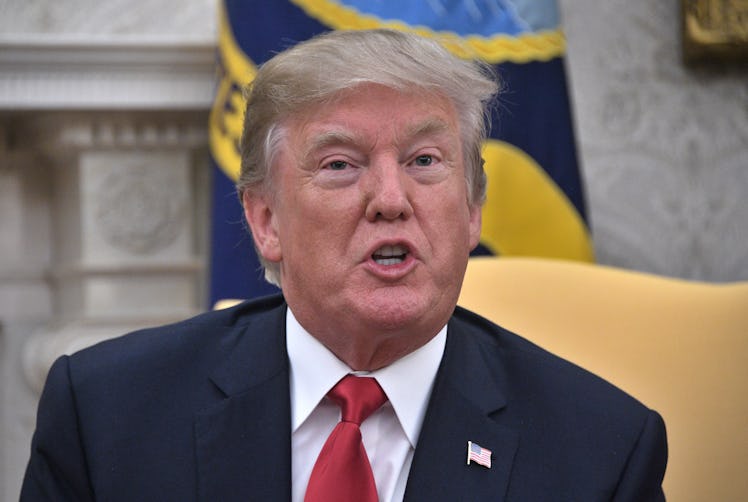
Days After Rolling Back Birth Control Coverage, Trump Discusses "Power Of Women"
Today, Oct. 11, is the International Day of the Girl, a U.N.-sanctioned holiday meant to celebrate and advocate for better lives for girls around the world. In, uh, celebration, President Donald Trump released a statement lauding the "power of women." Trump's Day of the Girl statement pledged the administration's commitment to the social and economic empowerment of girls and women around the world. The problem? The Trump administration has a nasty habit of advocating for and even mandating legislation that hurts girls and women.
In 2011, the United Nations declared Oct. 11 the International Day of the Girl in order to "help galvanize worldwide enthusiasm for goals to better girls’ lives, providing an opportunity for them to show leadership and reach their full potential."
With the U.N.'s mission in mind, Trump's statement seems right on the money. The 391-word statement mentions power and empowerment four times and asserts the Trump administration's commitment to helping girls and women around the world pursue their dreams.
The statement (which you can read in full here) opens,
On the International Day of the Girl, we recognize how girlhood shapes the lives of all women, and we promote the empowerment of more than 1 billion young girls growing up around the world. [...]
Today, the United States reaffirms its commitment to ensuring that every female, young and old, is empowered to pursue her dreams. We recognize that the girls of today will tomorrow be leaders in every nation and every sector of the economy.
But it's hard to ignore the irony of this cheerleading, we-can-do-better statement given what's going on in the United States right now.
While Trump gives lip-service to embracing "the power of women," he has paved the way for legislation that will prevent American girls and women from fully participating in society. In fact, it's been less than a week since the Trump administration rolled back guaranteed birth control coverage for 62 million women.
What does empowering girls and women have to do with Trump's decision to rescind the birth control mandate? you may be wondering.
A lot, actually.
The National Women's Law Center (NWLC) states, "The economic security of women and families is directly tied to a woman’s access to reproductive healthcare." For instance, "the average cost of a full year’s worth of birth control pills is the equivalent of 51 hours of work for someone making the federal minimum wage of $7.257."
Trump's roll-back is making women pay — if they can afford it — in order to not have children. By forcing women to buy birth control without insurance coverage, Trump is essentially taxing women so they can determine if and when they have children.
And access to birth control is also linked to — surprise! — lower teen pregnancy rates, which means that if American girls are going to live their lives to the fullest and fully participate in the American economy on their own terms, they need access to birth control. Teen pregnancy affects educational achievement, graduation rates, and employment prospects, according to the National Conference of State Legislatures. Which is unfortunate, given that the Trump administration quietly ended several teen pregnancy prevention programs earlier this year, according to The Center for Investigative Reporting's website, Reveal.
Further, the ability for women to determine if and when they have children is, according to NWLC, linked to "greater educational and professional opportunities" among women. And this is all to say nothing of the ways in which Trump's support for the various GOP health care proposals would have harmed women and girls.
So when Trump says, on the International Day of the Girl, that he is committed to "ensuring that every female, young and old, is empowered to pursue her dreams," that does not square with his decision to eliminate mandatory birth control coverage.
The statement also discusses the importance of access to education:
Around the world, girls are less likely than boys to be enrolled in school, which deprives them of vital resources and their best chance to learn the skills needed for a successful adulthood and life in a modern economy.
But the Trump administration, while highlighting a $200 million program which directs funds to STEM education for girls and minorities, left out some of the proposed budget cuts which would hurt girls' education.
Under Trump's proposed budget, the Department of Education would lose $9.2 billion in funding, including cuts that "would exacerbate student debt" and disproportionately hurt poor, minority, and disabled students, according to NPR. The Trump proposal would also cut $403 million in health profession and nurse training — a profession which is disproportionately made up of women, according to CNN.
And that's to say nothing of the DOE's decision to roll back Title IX protections for survivors of sexual assault on college campuses, despite the detrimental effect sexual assault — an epidemic on college campuses that, by and large, affects women — can have on academic performance.
So if Trump really wanted to commit to helping girls and women across the world, he would advocate for more access to birth control, more money for education, and health care and educational environments that support equity between the sexes.
Of course, Trump's statement ends with the same empty words and promises it led off with: "Today, during the International Day of the Girl, we commit to upholding the God-given rights of all and working to ensure that every girl is born into a world where she is free to live her life to the fullest."
When we talk about reproductive rights — say, the right to affordable birth control — we're also talking about economic and social freedom for women. And without economic and social freedom, women cannot truly be equal.